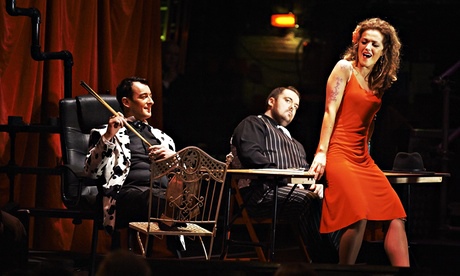
Bertolt Brecht and Kurt Weill's opera caused a storm when it was first staged in 1930, not only for its critique of capitalism but for its ground-breaking integration of jazz and cabaret with classical forms. Finding a way of doing justice to its originality is a test for any theatre company. The story of the foundation of Mahagonny, a city somewhere in the US, dedicated to pleasure, greed and excess, is dramatised by Brecht with a bluntness that undercuts the intricate harmonies of Weill's score. Depicting the gradual corruption of the city's inhabitants and culminating in the execution of a man for the crime of being penniless, the drama offers a stern moral warning.
This co-production by Rough Magic Theatre Company and Opera Theatre Company sets out to create an immersive experience in a Victorian music hall. With the orchestra seated in the stalls, the cast move through the auditorium into the upper circle and boxes. Some of the audience are in raised seating on stage, watching the performers up close and looking across at the ornate tiers of the theatre. The seating plan has the disadvantage of creating a very restricted traverse stage area, for which the cast do their utmost to compensate, delivering full-blooded performances, especially in the soaring ensemble singing of the second and third acts. These choruses are the highlight of Lynne Parker's production, with a threatening undercurrent that gradually builds momentum to the grim finale, when the corpse of the condemned lumberjack, Jimmy Mahoney (Julian Hubbard) is hoisted above the stage, in a form of crucifixion with no redemption.
Playing Trinity Moses, one of the trio of criminals who run the city and prosecute Jimmy, bass baritone John Molloy commands the stage. In a portrayal of sheer nastiness that has a seductive sheen, he brings an edge that seems missing from the other lead performances. While the reconfigured seating design creates an intense atmosphere, muddying the distinction a little between actor and observer, the production does not seem to go far enough to capture the sense of confrontation and unease at the heart of this piece.
• Until 22 June. Box office: + 353 1 818 719330. Venue: Olympia, Dublin.

